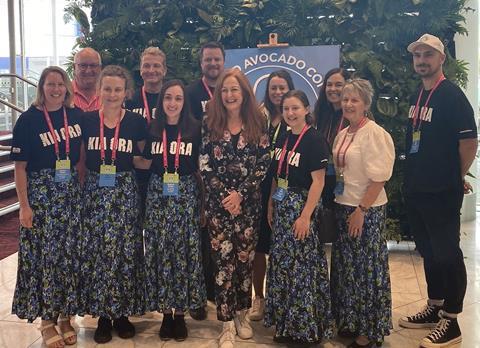Global industry urged to “take back the narrative” on sustainability
The time is right for the global avocado industry to reclaim the narrative around the fruit’s sustainability.
That’s according to Jen Scoular, president of the World Avocado Congress Committee and chief executive of New Zealand Avocado.

Speaking to Fruitnet on the final day of the congress, Scoular said the event’s academic programme highlighted a need to develop clear, validated claims about the benefits of avocados.
“One of the very strong themes to come out of the event is sustainability and the amazing work the industry is doing in this space,” said Scoular.
“For too long we have let the media talk about the negative aspects of avocados and avocado production without reining that in and saying, let’s put some scientific facts out there.”
Delegates to the World Avocado Congress didn’t have to look far to see examples of the scientific facts that Scoular speaks of.
The academic programme had multiple sessions dedicated to the topic of sustainability, including a session on consumer marketing and nutrition on day three, which highlighted research commissioned and delivered by the Hass Avocado Board.
A high-powered preliminary session on day two also examined the topic of sustainability. During this session, Florence Van Dyke, sustainability lead at New Zealand Trade and Enterprise and co-founder of Nelson-based beverage company Chia Sisters, told delegates about the value that validated sustainability messaging can unlock.
“Consumers are aligning their care for the planet with their spending,” Van Dyke explained.
“They’re looking for honesty and transparency as to what is being done in the sustainability space and what can be improved from this perspective.
”By sharing data within your industry, you can find and capture the low hanging fruit together.”
Scoular hoped the event would be a catalyst for action.
“As we’ve heard this week, every country has got initiatives that are phenomenal. And true, we’re going to make improvements, but let’s actually set the narrative straight that avocados are not doing so much damage to the environment and really highlight the amount of benefit they deliver in terms of nutrition and culinary variety,” Scoular explained.
“Let’s balance the books and take back the narrative. Let’s work together as global industry and share consistent messages around sustainability and the amazing nutrition of avocados.”
With over 1,100 delegates from across the supply chain travelling to Auckland for the event, Scoular said the tenth World Avocado Congress had been an enormous success and a valuable chance for New Zealand to showcase its country and it’s avocado industry to the world.
“Talking to many of our New Zealand Avocado members over the last week, the first thing that they say is how proud they are. They’re proud of our industry and the chance to show it to the world,” Scoular said.
“By global standards, we’re a relatively small industry, making up just 1.5 to 2 per cent of global production but being here the last week you wouldn’t know it. It’s just given us immense pride that we can bring over 30 other avocado producing countries here to New Zealand and discuss the big opportunities for the industry.
“I’ve never seen so much energy, laughter and smiling in one place. It’s just been phenomenal, it’s a very passionate group of people here.”
Fruitnet will have more coverage on the World Avocado Congress over the coming week.



